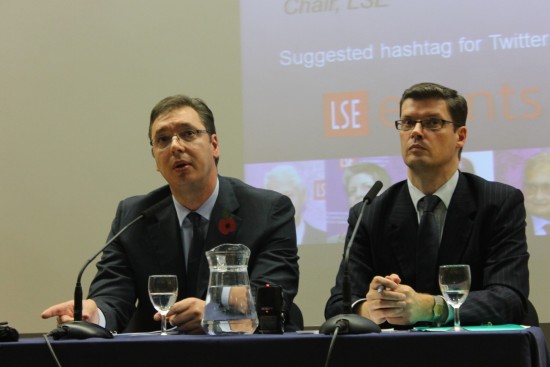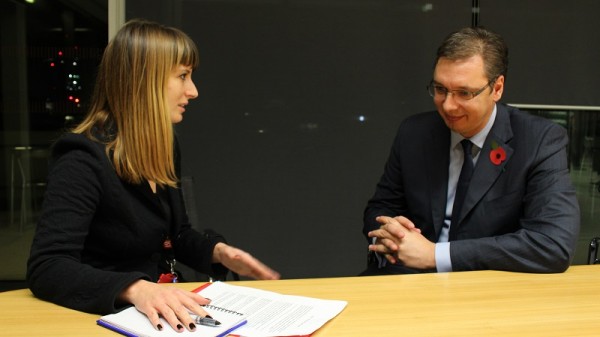We caught up with Serbian Prime Minister Aleksandar Vucic after his talk at the London School of Economics, held on 27 October 2014. Interview by Tena Prelec. Click here for the Serbian version.

THE PAST
I think my current politics best speaks about it.
Many people think that your past is problematic and point at its negative aspects. We would, quite on the contrary, like to ask you which achievement you are most proud of during your time as Minister of Information under Slobodan Milosevic?
I didn’t really have a lot of achievements, and what I am proud of today is hard work. I am proud of never having been lazy. As far as results are concerned, I can tell you that the fight against corruption and the economic reforms are what I am most proud of now, but looking back at that period – it is most certain that I have never been lazy and have never acted against my country. It is not difficult for me to admit that some of the proposed laws were bad. This is the difference between me and my critics: the fact that I am able to criticise myself sharply, while they are only able to level criticism at me and never at themselves.
In the past you were vocal in your opposition to Ratko Mladic’s extradition to the Hague.
It wasn’t exactly like that. I was opposed to the arrest of people who were hanging street names. But it is unquestionable that I was involved in events that were a part of the political factor I belonged to.
You were opposed to the arrest of people who replaced the street signs for “Zoran Đinđić bulevard” with “Ratko Mladic street”. Do you regret this now?
I don’t really know what regretting would mean, but in any case I believe that my current way of doing politics best speaks about it.
So today you would have behaved differently?
Let’s pass on to the next question please.

EXTERNAL RELATIONS
I said exactly what I was thinking, as I always say what I think.
To everyone, straight in the face.
The reactions that followed after the incident during the Serbia-Albania football match have shocked many observers. How will Serbian-Albanian relations develop now?
Mr Rama and I have very different views on the events that happened during that match. In spite of this, we need to sit down and speak about problems that are much more important than a football match. We will be solving political and economic issues, and I will welcome him to Belgrade after 68 years. I do not see any problems. It is an enormous step forward.
What were you thinking about when you were standing next to Putin at the military parade in Belgrade?
I wasn’t standing next to him at the parade, I was standing next to him at the press conference. I was thinking about what I was about to say, so among the rest I said that Serbia wants good relations with Russia, but that Serbia is on its European path and that is our strategic goal. I said what I was thinking, as I always say what I think. To everyone, straight in the face.
Don’t you think that the organization of such a parade during Russian military engagement in Ukraine and in the midst of criticism from the EU is controversial?
I do not think it is controversial because this was not just a pointless parade, it was a parade to mark the liberation of Belgrade. Sorry but it was the Russians who took part in the liberation of Belgrade, not some other people. If others took part in it, we would call them as well.
MEDIA FREEDOM
We have a lot of pluralism: I enjoy it very much when people are attacking me.
I feel particularly well then.
Media freedom is becoming a really serious concern for foreign observers of Serbia. It is becoming clear that the EU is determined to look into this issue in more detail, following the recent EU progress report. Your government has taken steps in terms of the legal framework, but this does not seem to be enough. How are you going to ensure pluralism, i.e. that even voices critical of your government, such as Olja Beckovic’s, find space in the media?
(sarcastic) Well I didn’t know that journalists want to be politicians and are critical of the government, I thought that they were professionals, that they were objective. But you said well, someone is critical. However, that is all right, I have no problems with that. Talk to someone from the European Union, since the owner of that television (B92, where Olja Bečković’s programme “Utisak Nedelje” was aired, e.n.) is an EU citizen. What connection does this have with me? What do you want me to do in this regard? Tell me and I will help you. I have been hearing such accusations tonight as well, but nobody is proposing what to do.
Do you have a proposal from your side: how are you going to ensure pluralism?
We have a lot of pluralism: I enjoy it very much when people attack me. I feel particularly well then. I never feel well when nobody is attacking me.
You therefore think that there is no problem in Serbia as far as media freedom is concerned?
I am not saying that there is no problem. Some things can be done much better, and we are going to work on that. It happened that someone was repeatedly taking down websites, such as Pescanik. This is something that concerns the police and the relevant institutions working on that. We have got the very best media laws. These laws now need to be implemented. I will not meddle in this in any way.
My proposal is: I will do everything I can so that everyone can speak against me every day. I do not object to this in the least, and my victories will be even more convincing, my results will be even more convincing. Jokes aside, every criticism is welcome, and really it is welcome. I think that what we saw tonight at the LSE, where 40% of the public was against me and 60% in favour, is a good reflection of Serbia. It is the perfect reflection of a democratic Serbia. People thinking differently, about different issues.
REFORMS
I absolutely guarantee for the transparency of the privatisation process.
Which is the single most important reform your government has undertaken to pursue EU integration?
Economic reforms are the single most important condition for our entry into the EU. They are fundamental for us to get in not as a country asking for mercy, but as a people contributing to the European economy in the most serious way. That is why we need to change ourselves, that is why we need to set the basis for a real market economy: to be able to lure investments and investors in the best possible way, to do everything that is in our power to behave in a responsible way towards those who are investing money in Serbia, to ensure that they can make a profit in our country, that they can have full legal security. When these reforms are carried out, we will have much more success. But to obtain this we need to work much more, we need to change ourselves.
You mentioned the need to reassure foreign investors. We received a concerned letter by Agrobanka shareholders, who are still waiting for compensation two years after the bank was terminated. When are they to receive compensation? How do you think this affects foreign investors’ perception of Serbia?
It would be unfair of me to answer this question and to dwell on how the executive board and its proxies behaved, and how certain tycoons lifted money. The country of Serbia will certainly take up all measures allowed by law to compensate all those who have lost something that belonged to them, but it cannot indemnify those who have obtained something in an illegal way. So I think that there will not be any problems, in any case.
When do you think that they will be compensated?
I would like to see in detail how things stand in this case, and answer only then.
Don’t you think that this story can have a negative impact on the perception of other investors?
I don’t, because I think that every investor who is truly interested in Serbia will look for other examples.
In terms of economic reforms, privatisation is certainly an important part of it. Do you think that Serbia has something to learn from the other countries in the region, e.g. Bulgaria, and what?
I think that we have much to learn from the other countries in the region, but we also have much to learn from the way we have conducted privatisation ourselves. Privatisation is necessary because private capital is what takes the economy forward.
What was the problem at the beginning of the privatisation process in Serbia, and what was partially the problem in Bulgaria as well, is that the companies with high profitability were sold out immediately and after that buyers were acquiring companies only for their assets, firing the workers and not taking care to find a market for their products. I think this time has passed and that we are now entering a time of, I would say, rational capitalism where both the state and the private sector behave rationally and in line with the economic interest.
We have now announced 502 public companies entering the privatisation process and expect a large number of people to take part in this procedure. That is very important for us.
However, most of these 502 companies are neither big nor profitable.
Some aren’t, some are. There are companies like Agrokor Kompleks that are very profitable, like PKB.
We are interested in what will happen to those truly large public companies in need of privatisation that have not been mentioned in the call for expression of interest you refer to, such as Telecom Serbia or EPS. What will happen with them?
This is a different story. We are currently looking for an investment partner for Telecom Serbia and are then going to announce a public and transparent tender for that company. As for EPS, it is most certain that we will not sell out the majority package of the shares, but are looking for an investor interested in the minority package, as a strategic partner.
As for the tender you mentioned: will it be possible for off-shore companies, registered in places where its owners are not easy to check, to take part in the bidding procedure?
This depends on the conditions of the tender, but I think that the privatisation council, together with the Telecom Serbia management, will set up the most suitable conditions.
So you do not have an answer on whether the tender will be open to off-shore companies or not?
I didn’t say that I do not have an answer, I said that the privatisation council will take a decision on the exact conditions for that tender. It will be transparent and open for anyone who will be able to offer the best deal.
You therefore guarantee that the tenders will be fully transparent?
I absolutely guarantee for their transparency.
___________________________
Photographs by Jakub Krupa.
Note: This article gives the views of the interviewee, and not the position of LSEE Research on SEE, nor of the London School of Economics.




3 Comments